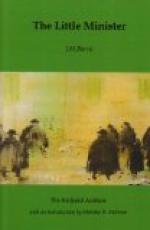“I would think it was a black-burning disgrace for a minister to be fond o’ flowers.”
“I dinna haud wi’ that.”
“Jean,” said Haggart, “I allow no one to contradict me.”
“It wasna my design. But, Tammas, if a—a minister was fond o’ a particular flower—say a rose—and you destroyed it by an accident, when he wasna looking, what would you do?”
“I would gie him another rose for’t.”
“But if you didna want him to ken you had meddled wi’t on his chimley, what would you do?”
“I would put the new rose on the chimley, and he would never ken the differ.”
“That’s what I’ll do.” muttered Jean, but she said aloud—
“But it micht be that particular rose he liked?”
“Havers, Jean. To a thinking man one rose is identical wi’ another rose. But how are you speiring?”
“Just out o’ curiosity, and I maun be stepping now. Thank you kindly, Tammas, for your humour.”
“You’re welcome,” Haggart answered, and closed his window.
That day Rob Dow spent in misery, but so little were his fears selfish that he scarcely gave a thought to his conduct at the manse. For an hour he sat at his loom with his arms folded. Then he slouched out of the house, cursing little Micah, so that a neighbour cried “You drunken scoundrel!” after him. “He may be a wee drunk,” said Micah in his father’s defense, “but he’s no mortal.” Rob wandered to the Kaims in search of the Egyptian, and returned home no happier. He flung himself upon his bed and dared Micah to light the lamp. About gloaming he rose, unable to keep his mouth shut on his thoughts any longer, and staggered to the Tenements to consult Haggart. He found the humourist’s door ajar, and Wearyworld listening at it. “Out o’ the road!” cried Rob, savagely, and flung the policeman into the gutter.
“That was ill-dune, Rob Dow,” Wearyworld said, picking himself up leisurely.
“I’m thinking it was weel-dune,” snarled Rob.
“Ay,” said Weary world, “we needna quarrel about a difference o’ opeenion; but, Rob—”
Dow, however, had already entered the house and slammed the door.
“Ay, ay,” muttered Wearyworld, departing, “you micht hae stood still, Rob, and argued it out wi’ me.”
In less than an hour after his conversation with Jean at the window it had suddenly struck Haggart that the minister she spoke of must be Mr. Dishart. In two hours he had confided his suspicions to Chirsty. In ten minutes she had filled the house with gossips. Rob arrived to find them in full cry.
“Ay, Rob,” said Chirsty, genially, for gossip levels ranks, “you’re just in time to hear a query about the minister.”
“Rob,” said the Glen Quharity post, from whom I subsequently got the story, “Mr. Dishart has fallen in—in—what do you call the thing, Chirsty?”
Birse knew well what the thing was called, but the word is a staggerer to say in company.




